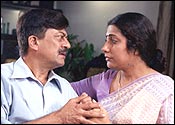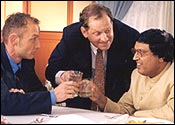
|
Something exclusive
On the sets of Prakash Belawadi's comic, realistic drama Stumble
|
M D Riti
"I want something really exclusive," says a fat, bald, bespectacled customer, his large ear studs glinting as he shakes his head.
"Sure," replies popular radio jockey Priya Ganapathy. "Reshma! Can you pull out some of that special stuff for us?"
A real-life salesgirl comes forward self-consciously, reaches under the counter and pulls out some black and red G-strings held together by silver pompoms. The customer picks up a black string bikini top, consisting only of black cords and two silver tassles. His entire body jiggles and heaves with laughter as he walks towards the camera, holding up the frothy piece of lingerie.
"Cut!" yells director Prakash Belawadi as the camera, wielded by American Clay Kelton zooms in on some of the store's naughty lingerie for a close-up. A light boy ducks under a pair of gossamer white pajamas as a sound technician struggles to emerge from behind an artistically displayed transparent lemon yellow bikini.
Belawadi holds up a pair of miniscule green briefs and asks Ganapathy, dressed in a blue salwar-kameez, casually, "Should we have used these instead?"
We are on the sets of Stumble, a full-length English feature film being shot in Bangalore (in the south Indian state of Karnataka), by journalist-turned-filmmaker Belawadi. Supporting him in his first film as director is another well-known journalist Tushita Patel, formerly of The Asian Age, now executive producer in this venture.
The scene being shot comes towards the end of the film. It features Ganapathy, a real-life radio jockey as a lingerie store owner, and well-known Bangalore stage artiste Ashok Mandanna as her husband. The location is the well-known lingerie boutique Petteons on Commercial Street. The shop is closed. It is a Sunday morning, but its sales staff is present at the film crew's request, ready to jump into action as supporting cast.
 This scene actually features the actors in a subplot of the film. The real story revolves around a typical urban middle-class, middle-aged couple, played by actor and former minister Anant Nag and popular Tamil actress Suhasini. The two artistes have acted in quite a few Kannada films together, and their easy rapport portends well for the film. The plot is simple, but is fleshed out by numerous anecdotes, subplots and characters.
This scene actually features the actors in a subplot of the film. The real story revolves around a typical urban middle-class, middle-aged couple, played by actor and former minister Anant Nag and popular Tamil actress Suhasini. The two artistes have acted in quite a few Kannada films together, and their easy rapport portends well for the film. The plot is simple, but is fleshed out by numerous anecdotes, subplots and characters.
"It is not a celebratory film like Monsoon Wedding or Hyderabad Blues," says Nag. "This is a very realistic film showing the problems of the urban middle class in India, which is buffeted on all sides. People work in banks for 35 years and then take voluntary retirement, hoping to use the last five years of productivity they have usefully. But then the same government that offers them VRS lowers the interest rates. Yet, the middle class weathers all these ups and down stoically."
Belawadi describes the film as a comic drama. "It is hard to tread a tightrope between comedy and drama," he says, ruefully, shaking his head over a glass of juice at a restaurant near the lingerie shop. He is reluctant to disclose its budget, insisting it is on par with the usual Kannada commercial film (which would place it in the region of less than Rs 10 million). However, he is more than happy to reveal that this budget was put together from small sums of money contributed by countless friends and wellwishers.
 Stumble is about a bank manager who takes voluntary retirement and then loses all the money he got as his golden handshake by investing it in mutual funds. "My character is quite a bit like that of Willy Lomax in Death Of A Salesman," says Nag, who is by far the most cerebral of the actors on the Kannada screen today.
Stumble is about a bank manager who takes voluntary retirement and then loses all the money he got as his golden handshake by investing it in mutual funds. "My character is quite a bit like that of Willy Lomax in Death Of A Salesman," says Nag, who is by far the most cerebral of the actors on the Kannada screen today.
His grown-up children in the film are software engineers --- his son in the US and his daughter in Bangalore. By a complicated sequence of events, his son returns home, laid off work in the US, and the company his daughter works for simply folds up. However, the film ends on a positive note, with the ex-banker's wife, also a bank employee, taking on the job of setting the family right.
The film also casts popular villain and character actor Mukhyamantri Chandru as a crooked politician and head of a cooperative bank, comic actor Sihikahi Chandru as his aide, and several actors from Bangalore amateur theatre like Anil Abraham and Ajit Bhide in smaller roles. Kannada serial starlet M D Pallavi acts as the daughter with Ajit Hande as the son.
"I enjoy my character of a phoney socialite who is all surface with nothing underneath," says Ganapathy, who has done a small role in a Kannada film earlier.
Cameraman Kelton also acts in the film as a Mauritius-based businessman, while Russel Burns acts as a British investor.
 "Our main selling point is our plot," says Patel, who has already approached distributors and film marketers all over the world for this film. The story, script and dialogues are by Belawadi. This is Kelton's first feature film as cameraman. He studied this craft in New York and now lives in Bangalore, where he runs a sound recording studio. "I am really enjoying this film," he says.
"Our main selling point is our plot," says Patel, who has already approached distributors and film marketers all over the world for this film. The story, script and dialogues are by Belawadi. This is Kelton's first feature film as cameraman. He studied this craft in New York and now lives in Bangalore, where he runs a sound recording studio. "I am really enjoying this film," he says.
If Belawadi wanted to produce a professionally made mainstream English film, would it not have been safer opting for a seasoned movie cameraman? "I think it is critical to have an organic relationship between the camerawork and the subject treatment, and Clay is achieving that perfectly," he explains.
Belawadi and Patel began researching for the film May 1. The script was written in June and almost all the shooting was completed from August 1 to 18. There was one last schedule a couple of days ago. Now, the film is ready for post-production work.
Are they targeting audiences in India or the US with this film, which discusses issues common to both countries like the dotcom bust, layoffs and financial scams? "I am targeting audiences who see English films anywhere in the world," says the clean-shaven, greying Belawadi, simply. "Dialectically, this film would have been inappropriate in any language other than English. The issues it deals with are such. I have tried to make a mainstream movie that is contemporary and real, and that remains far from the label of alternate cinema. After all, four-and-a-half minutes of raw stock costs Rs 9,000 to film, so I had to be sure that my film has a wide appeal."
Will their audience be large enough for the film to be profitable? "I do believe there is a large audience that is totally free from linguistic barriers," says Nag. "What with markets overseas and India, and television, I am sure the film will earn a profit. My brother Shankar and I managed to reach out fairly successfully to such audiences almost two decades ago with the English version of our television serial Malgudi Days."